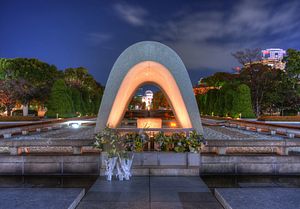The Rebalance author Mercy Kuo regularly engages subject-matter experts, policy practitioners and strategic thinkers across the globe for their diverse insights into the U.S. rebalance to Asia. This conversation with Dr. Gregory Kulacki – China Project Manager for the Union of Concerned Scientists, who conducts research on China’s nuclear weapons program and facilitates dialogue on nuclear arms control between the United States and China, is fluent in Mandarin Chinese and an expert in cross-cultural communication, and has lived and worked in China for more than twenty years – is the 44th in “The Rebalance Insight Series.”
Explain the symbolic and substantive importance of President Obama’s upcoming visit to Hiroshima.
The nuclear arms control community wants the president to earn his Nobel Prize by announcing concrete and achievable steps to make good on his promise to reduce the role of nuclear weapons in U.S. national security strategy. The Union of Concerned Scientists argues a presidential directive to take U.S. ICBMs off high alert, like President George H.W. Bush’s order to take the strategic bombers off alert, is the president’s best option. He can accomplish this before he leaves office without negotiating a treaty or holding a vote in Congress.
The president appears to want to solidify the U.S. “rebalance to Asia.” His Asia hands, not the nuclear policy experts, reportedly vetted decisions about Hiroshima. Regional issues, like the Trans Pacific Partnership, are a priority. As Mr. Obama ponders his legacy, the fate of his outreach to Asia may seem more consequential than his contributions to nuclear arms control.
What key points should the U.S. president convey to the Japanese government and public?
Prime Minister Abe is nationalist who believes Japan’s military conquest of Asia, the invasion of China and the bombing of Pearl Harbor were justified. He honors the men who conspired to commit these crimes against peace. There is a danger President Obama’s visit to Hiroshima will be misinterpreted by some Japanese leaders as a vindication of Mr. Abe’s view of history. President Obama should condemn the policies of imperial Japan and remind the Japanese public that it was Japanese nationalism that led to the war that ended with the tragic bombing of Hiroshima and Nagasaki.
Many of the hibakusha – the victims of the atomic bombings – understand this. President Obama should make clear that he came to Hiroshima to honor them, to listen to their stories, to remember their suffering and to thank them for their efforts to make sure nuclear weapons are never used again.
What message should POTUS signal to regional neighbors – China, South Korea, North Korea and Russia – on this visit?
Within Japan, and all across Asia, millions of people suffered for the arrogance and ambition of the men Mr. Abe commemorates with his visits to the Yasukuni Shrine. People throughout the region, especially in Korea and in China, will be looking for an acknowledgment that they were victims too.
President Obama admires Asia’s postwar peace and prosperity. The “rebalance” aims to protect it. The looming threat is not the rise of China per se, but the rise of Chinese nationalism. Balancing it with other Asian nationalists is the classic response. Declaring nationalism itself the common enemy is more prudent. Otherwise historians may conclude Obama’s “pivot to Asia” was just another divide-and-conquer stratagem that set allies against adversaries in a contest that tragically destroyed what he sought to protect.
How might Northeast Asia’s nuclear past mitigate the region’s nuclear present and future risks?
Albert Einstein worried that the development of nuclear weapons changed everything except our way of thinking. The power of the nuclear weapons transformed nationalism, which Einstein once called “the measles of mankind,” into a terminal cancer that threatens human civilization. Yet too many rulers in Asia and the United States still act as if it is possible to fight and win a nuclear war.
The United States plans to develop a new nuclear cruise missile that Japan and South Korea allegedly want the United States to make available in the event of a military crisis in Asia. China is considering placing its nuclear forces on high alert so they can be launched on warning of an incoming attack. North Korea plods on in its quest for a functioning nuclear weapon.
A speech warning against the suicidal combination of rising nationalism and nuclear brinkmanship, delivered on the hallowed ground of Hiroshima, would be a memorable rejoinder to the unfulfilled promise of Prague. It would solidify his legacy as a force for good in Asia. Canceling plans for a new nuclear cruise missile would prove he deserves that legacy.
What three priorities face the next U.S. president on U.S.-China nuclear relations, and what are implications for U.S. leadership in Asia?
First, the next president should recognize there’s a growing risk of nuclear war with China. Next, convince Chinese leaders to talk about it. Then take concrete steps to reduce the danger.
The risk of war is growing because there is no mutual trust. U.S. and Chinese leaders try hard to avoid conflict but don’t discuss contentious issues seriously. Festering disputes over Taiwan, North Korea and China’s territorial waters drive accelerating preparations for war, including upgrades to nuclear forces. Bilateral diplomacy needs an upgrade too.
Nuclear use is possible because accidents happen in war. Command and control is imperfect. Intelligence, surveillance and reconnaissance equipment might be damaged or destroyed. China could mistakenly initiate a nuclear response to a conventional U.S. missile launch. The United States could make the same mistake.
Nuclear weapons won’t keep the peace in Asia; diplomacy will. Balancing national ambitions against each other is not diplomacy; Thucydides taught us it’s a recipe for war. Hiroshima reminds us of the terrible consequences of war in the nuclear age.
Successful leaders learn from history rather than repeat it.
Mercy A. Kuo is an advisory board member of CHINADebate and was previously director of the Southeast Asia Studies and Strategic Asia Programs at the National Bureau of Asian Research.

































